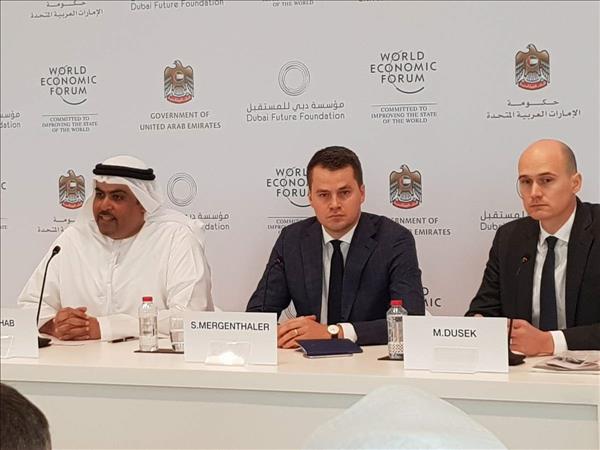
UAE, WEF map bright future
The event gathers more than 700 scholars and future experts from 75 countries and attendees will convene in 35 Councils, each of which addresses key issues in a vital strategic sector, and work to propose practical solutions for the challenges that are likely to arise. The Councils represent the largest gathering of future experts in 35 vital sectors. It is an important opportunity for the UAE and the region to learn about the latest global trends and best practices, and to play our part in shaping the future of the most strategic sectors.
The fourth industrial revolution, artificial intelligence, robotics, blockchain, innovation and entrepreneurship are all major topics on the Councils' agenda. The Councils forecast future directions within key sectors, look into the challenges that are likely to arise and propose innovative solutions to tackle them, in addition to flagging potential opportunities. The key findings of the Annual Meeting of the Global Future Councils are the foundation that the world can build on to forecast the future. Key takeaways and findings from the Meeting will be presented at the World Economic Forum in Davos, Switzerland."The fourth industrial revolution will have a disruptive impact on business models, the economy, society and each individual. To shape a positive outcome of this revolution, the World Economic Forum has created the Annual Meeting of the Global Future Councils to convene the foremost global thinkers to accelerate the positive impact of this revolution" said Klaus Schwab, Founder and Executive Chairman, World Economic Forum.
Echoing similar sentiments, Mohammad Abdullah Al Gergawi, UAE Minister of Cabinet Affairs and the Future of the UAE, said: "The fourth industrial revolution is already having a profound effect on societies and economies: as we look to build a future for our country and for the world, it is essential that we embrace these forces of transformation and use them in ways that help us emerge stronger and better adept at advancing the interests and well-being of our people. By harnessing relevant forces of change and focusing on the active roles of citizens and younger generation aspirations exciting outcomes of the fourth industrial revolution will be realised. The Annual Meeting of the Global Future Councils is about drawing on world-class knowledge and applying it in ways that help us meet these goals."The Annual Meeting of the Global Future Councils allows participants to communicate directly with representatives from WEF's Fourth Industrial Revolution Center in San Francisco, USA, to propose innovative approaches that can harness 4IR technologies to reap economic and social benefits. These technologies include artificial intelligence and automated learning, self- driving cars, Blockchain, drones, digital commerce and the Internet of Things (IoT).
The UAE boasts the 17th most competitive economy in the world, according to the World Economic Forum's Global Competitiveness Index 2017-2018. Oil accounted for 63 per cent of the UAE's GDP as of 2014, according to an International Monetary Fund report. However, the country is shaping a development agenda that looks beyond oil-dependent sectors. The UAE aims to foster one of the most diversified economies in the Middle East and North Africa region, and is already recognised as a leading global financial and transportation hub, which offers world-class infrastructure. The UAE's Vision 2021 government plan has prioritised scientific advancement, broader adoption of renewable and clean energy, and investment in the country's innovation potential.In a Press event addressed by Atraf Shehab, director of the Future Department, Prime Minister's Office, UAE; Stephan Mergenthaler, head of knowledge networks and analysis, member of the executive committee, World Economic Forum and Mirek Dusek, head of Middle East and North Africa, member of the executive committee, the consensus was to address the digital era among other top priorities to unlock potential of regional and global developments. Dusek, said: "The promise of the Arab digital economy is the biggest unreported story, because there is a real progress in the region where you see the digital economy being embraced so well."
Meanwhile, the World Economic Forum opened the public access to its Transformation Maps - a dynamic knowledge tool covering more than 100 industries, countries and issues shaping the modern world. The Forum's Transformation Maps were first developed in 2015 as a tool for understanding and visualising industries, countries and issues, and how they interact with and disrupt each another. Since then, 125 maps have been created and used to inform work across the Forum's 14 System Initiatives as well as strategic decision-making by governments and businesses around the world."We will only solve the challenges we face by first understanding individual issues and how they influence each other. We hope such 'system thinking', aided by the expertise of some of the world's leading establishments and the technologies of the Fourth Industrial Revolution, will help our collective effort to build a future that is inclusive and human-centred," said Jeremy Jurgens, head of knowledge and digital engagement, member of the managing board, World Economic Forum.
"Bold action to address global challenges requires the understanding, support and mobilisation of all members of society. We hope that by making available the collective intelligence of the Forum's expert networks - captured in our Transformation Maps - as a public good we can inspire creativity and fresh thinking," said Mergenthaler.-
Sandhya D'Mello Journalist. Period. My interests are Economics, Finance and Information Technology. Prior to joining Khaleej Times, I have worked with some leading publications in India, including the Economic Times.

Legal Disclaimer:
MENAFN provides the
information “as is” without warranty of any kind. We do not accept
any responsibility or liability for the accuracy, content, images,
videos, licenses, completeness, legality, or reliability of the information
contained in this article. If you have any complaints or copyright
issues related to this article, kindly contact the provider above.


















Comments
No comment